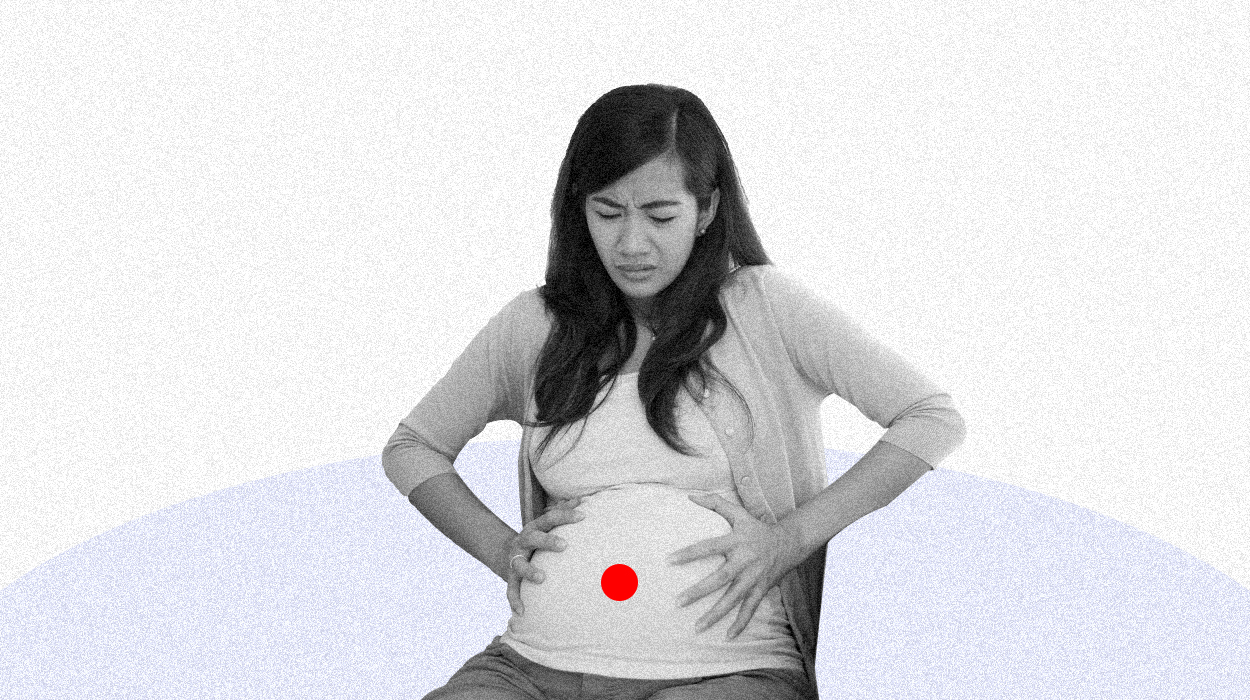 Expert's opinion
Expert's opinion
Expert's opinion
The article is a subjective view on this topic written by writers specializing in medical writing.
It may reflect on a personal journey surrounding struggles with an illness or medical condition, involve product comparisons, diet considerations, or other health-related opinions.
Although the view is entirely that of the writer, it is based on academic experiences and scientific research they have conducted; it is fact-checked by a team of degreed medical experts, and validated by sources attached to the article.
The numbers in parenthesis (1,2,3) will take you to clickable links to related scientific papers.
Constipation During Pregnancy: Causes, Treatment & Home Remedies In 2024

One of the unpleasant but more common side effects of pregnancy is constipation, the uncomfortable feeling you get when you struggle to make a bowel movement. It can lead to pain, bloating, and cramping. Also, straining to force the bowel movement can lead to painful swelling of veins (hemorrhoids).
Constipation, simply, is a problem with hydration and intestinal mobility; feces (waste) must not be too hard and your intestinal tract must have the rhythmic mobility to move them toward your rectum. When excess waste and gas begin to build up inside your bowels, the bowel walls can get distended, making bowel function even less effective and a vicious cycle begins.
Throughout life, people will experience constipation from time to time for various reasons. However, when a woman is pregnant, the hormones fluctuating throughout her body, primarily progesterone, increase the chance of what doctors call pregnancy constipation.
When Does Constipation Start In Pregnancy?
Every pregnant woman is different, but many will begin to feel constipation in early pregnancy when the pregnancy hormone, progesterone, rises, usually near the end of the first trimester. Constipation during pregnancy at that time is most common.
It may also start or come back during the second or third trimester due to hormone levels in your body adjusting to support the growing fetus in your uterus. Those same hormones also interfere with intestinal motility impeding the regular flow of waste.
Constipation During Pregnancy: What Is Causes?
When you are pregnant, your body is changing. Hormones increase so you can successfully carry a baby to term, but they also create other changes in your body. For example, food tastes different when you’re pregnant because the increased estrogen affects the blood flow to your taste buds. Indeed, all daily habits change and make you adjust to a new reality. Regarding constipation, specifically, here is a more detailed breakdown of what’s happening or changing in your body
Featured Partner

Low-Calorie
Non-GMO
Vegan-friendly
Get Blown Away By Expert-Crafted Formula
Learn More About Colon Broom – one of the quality supplements promoting regular bowel movements, alleviates bloating, and supports healthy cholesterol levels.
Progesterone
An apple cider vinegar for the dandruff recipe can perfectly remedy the ailment. Knowing this doesn’t mean you should get into your kitchen and run straight with a bottle into the bathroom, seeing as direct use of apple cider vinegar on the hair can harm the scalp more than benefit it. Be sure to use it in combination with other ingredients to maximize the benefits.
This hormone is released by the ovaries and prepares the tissue in your uterus (womb) for pregnancy. Thanks to progesterone, the fertilized egg implants successfully in your uterus and grows into a baby. It also relaxes muscles, from those in your uterus to prevent premature delivery to those in your bowels, slowing the transit time toward your rectum.
Relaxed bowels allow your body the extra time it needs to get nutrients and water out of your food, creating the necessary energy and hydration for a pregnant body. Unfortunately, the longer that food sticks around, the more water gets absorbed and the harder the waste becomes, making it harder to push out.
A Growing Fetus
Your uterus is heavy and getting heavier because there’s a fetus inside that’s getting bigger every day. That weight puts pressure on your bowels, creating a mechanical obstruction to the passage of feces through the pelvis. Bowels work best when unobstructed, and pressure against them from the outside can stop the feces altogether; this causes distention of the bowel wall, which is painful (colicky).
Prenatal Vitamins Or Iron Supplements
Prenatal vitamins are rich in iron, and this is helpful because iron aids your body in producing the blood that’s required to get needed oxygen throughout both your body and your baby’s body. Some doctors might even prescribe iron supplements to ensure that there is enough to carry the oxygen needed.
But this becomes tricky because it’s easy to get too much iron, which contributes to constipation. After all, it makes it harder for your digestive system to break down food and your bowels to move the waste.
Unhealthy Lifestyle Choices
Pregnant women can feel tired and lethargic. Nausea due to the increased estrogen and thyroid hormone of pregnancy, as well as cravings, can interfere with the right dietary choices. The increased fatigue and dietary choices sometimes lead to women not getting enough exercise or eating healthy foods. Instead, they rest most of the time (are too sedentary) and choose foods that may bind. This combination makes bowel movements difficult.
Home Remedies For Constipation Relief During Pregnancy
Constipation during pregnancy means that the woman has infrequent bowel movements, defined by doctors as less than three bowel movements in a week; this can cause a lot of discomfort. Pregnant women are also hesitant to take medications to relieve these issues because they don’t want to risk harming the growing baby inside them.
Fortunately, constipation can often be treated or prevented without taking medication and, even better, the medications most frequently prescribed are safe. Nevertheless, to avoid medication, here are some lifestyle changes or home remedies that can help treat constipation.
Drink More Water
We are a species made to use water, but water has important benefits, specifically for pregnant women. Firstly, it lubricates digestion to move waste more efficiently through the body. Hydration also passes through the placenta and the fetal kidneys make the urine that helps form the amniotic fluid that protects the fetus. The American College of Obstetricians and Gynecologists suggests eight to 12 cups of water every day while pregnant.
At the same time, you should limit caffeine (coffee, tea, and colas, which increase urination), salt, and sugar (which distort the balance of hydration by causing water retention and then rebound urination), or anything else that might contribute directly or indirectly to dehydration. During pregnancy, you must strike a new water balance, making it harder for water to balance and do its job.
Drink Prune Juice
Prune juice contains a substance called sorbitol. This passes through your system attracting water into your digestive tract, bulking up a softer stool which triggers the urge to make a bowel movement.
A little goes a long way. Some people like to drink warm prune juice which can help ease the effects of constipation more quickly than cold prune juice, the heat acting as a stimulant for intestinal motility. If you don’t like the taste, try mixing in a bit of pineapple juice or orange juice.
Daily Exercise
You don’t have to train for a marathon; just get up and be mindful to move a little bit every day! This can include yoga, walking, or light jogging. Swimming is another wonderful way to get needed exercise when you’re pregnant, and buoyancy takes the pressure off your lower back and legs, important because progesterone also loosens ligaments of the joints. The weightless environment can also provide comfort, lessen swelling, and improve blood circulation.
Even light exercise will help your digestive system work efficiently because it stimulates the bowels. Do this at least three times a week for 20 to 30 minutes.
Eat More Fiber
Dietary fiber makes your stool bulkier but lighter, resulting in it becoming easier to move. Foods rich in fiber include fruits, veggies, legumes, beans, and whole grains.
Other Constipation In Pregnancy Treatment
If homemade remedies or lifestyle changes don’t seem to help, contact your healthcare provider. While laxatives are generally not the first choice your doctor will know for sure. They can prescribe safe laxatives during pregnancy. Sometimes other treatments can help
- A fiber supplement like Metamucil. You can easily add a spoonful to your water to make regular bowel movements.
- A stool softener for pregnancy will moisten the stool, making it easier to move through your body. Doctors believe these products are likely safe for a pregnant woman and her developing baby because the main ingredients are only slightly absorbed–if at all–when treating constipation.
- Lower the frequency of days taking prenatal vitamins or the number of iron supplements you’re taking. This is likely a temporary fix while your doctor recommends you add foods high in iron to your diet. You might also talk to your healthcare provider about taking smaller doses of iron throughout the day rather than bigger doses in the morning or evening. Spreading out the iron over time can help alleviate constipation and its side effects.
- Try not to strain or push too hard when passing a hard stool. This can cause or worsen hemorrhoids, which are swollen rectal veins that can become swollen and quite uncomfortable or even infected. Most hemorrhoids are harmless and get smaller or disappear after the birth of your baby. Just stopping the straining on the toilet will allow them to resolve. Continued straining, however, increases their severity, and even the fear of the pain from a bowel movement due to hemorrhoids can cause a person to avoid toileting, backing up things even worse.
When Should I See My Doctor?
Constipation is quite common and easily treated at home. However, if it lasts more than a few days and doesn’t improve with any of the above solutions, it might be best to contact your doctor. Pregnancy constipation and when to worry about it, as well as more advanced solutions for it, can be easily addressed with just a phone call most of the time.
You should see your doctor or midwife immediately if constipation or diarrhea during pregnancy is associated with severe abdominal pain or if you see blood or mucus in your bowel movements. As always, if you feel pain or there is any bleeding, call your physician.
The Bottom Line
Constipation, or the inability to push out a bowel movement, while pregnant, is common but uncomfortable. Often, you can treat constipation by merely drinking more water, eating foods high in fiber, getting in some mild daily exercise, and avoiding straining. See your doctor if this doesn’t work because you might need safe, stimulant laxatives, stool softeners, or Metamucil for added relief.
+ 1 sources
Health Canal avoids using tertiary references. We have strict sourcing guidelines and rely on peer-reviewed studies, academic researches from medical associations and institutions. To ensure the accuracy of articles in Health Canal, you can read more about the editorial process here
- A. Coquoz, D. Regli & P. Stute (2022) Impact of progesterone on the gastrointestinal tract: a comprehensive literature review, Climacteric, DOI: 10.1080/13697137.2022.2033203



